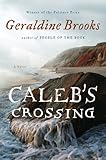[amazon_link id=”0670021040″ target=”_blank” container=”” container_class=”” ] [/amazon_link]Title : Caleb’s Crossing
[/amazon_link]Title : Caleb’s Crossing
Author : Geraldine Brooks
Genre : Historical Fiction
Publisher : Viking
Pages : 300 (Hardcover)
Source : Publisher ARC
Caleb’s Crossing is about a real character – Caleb Cheeshahteaumauk, the very first Native American graduate of Harvard College. Author Geraldine Brooks knits a story of fictional people round the character of Caleb. The narrator is Bethia Mayfield, the daughter of a missionary priest of the first few English settlers on Martha’s Vineyard. Bethia’s father is trying to convert the native Wampanoag to Christianity (or his version of Calvinism).
Bethia furtively becomes friends with a young Native American boy, and from him learns of the language and customs of the Native people. As time progresses this young lad (she calls him Caleb), led by a zeal to fight for his people by understanding the Christian culture and gaining their knowledge, comes to her father to further his education. Later when he goes to Harvard for higher studies, Bethia finds herself also at Harvard at the behest of her capricious elder brother Makepeace.
Since this are the 1600s, women are still relegated only to domestic chores and discouraged from seeking education, and inquisitive Bethia is asked to do the same by her father :
“You can read well I know, even write a little, sufficient to keep a day book, as your mother does, for the benefit of the household. But ’tis enough. Already it sets you far apart from most others of your sex. Tend to your huswifery, or look to developing some herb lore, if you must be learning something. Improve your wits usefully and honorably in such things as belong to a woman.”
Bethia finds herself immersed in the thankless drudgery of such chores at Harvard, while her brother and Caleb spend their time studying. Even so, even at the fringes of knowledge, intelligent Bethia learns much and begins to question her hapless fate; as a woman she finds herself perpetually at the mercy of one male edict or another. With very little agency of her own, and subject to the demands of her brother and family and a very conservative society, she still chooses wisely and refuses to be bound down by societal norms just because propriety demands it.
This book is almost a biography even though it is fiction. It tells of the life of Caleb Cheeshahteaumuck, from Bethia’s narration of events and from her viewpoint. But beyond that this is also an spirited tale about Bethia, and her predicament in the dark ages. This novel very artfully traces their lives, starting from when Bethia is quite young and loses her mother, and Caleb is but a young Wampanoag lad running about his vast land. Will Bethia be able to find some measure of solace as a woman kept away from the knowledge she so desires, and will Caleb find the power to save his people ?
This is an excellent read. Bethia’s tale and unique voice kept me engrossed; she is a very well-sketched character, and we get to know her quite well during the course of the book. Caleb too remains a central character but my sympathies were for Bethia. Brook’s develops her characters carefully and with much attention to historical detail. The language is very “olde English” and one of the reasons why this story rings so true :
He was the younger son of Nahnoso, the Nobnocket sonquem and his name was Cheeshahteaumauck. In his tongue, it means something like “hateful one.” When he told me this, I thought that my limited grasp of his language was defeating me. For what manner of people would name a child so?
I enjoyed this book very much; it’s sedate, beautiful prose a pleasure to read, reminding me of other such interesting historical novels like Tracy Chevalier’s “Remarkable Creatures” and “Girl with a Pearl Earring”.


[…] 4. Caleb’s Crossing by Geraldine Brooks […]